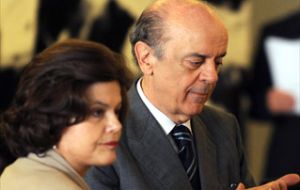MercoPress. South Atlantic News Agency
Serra closes in as presidential debate moves to abortion away from the economy
 Dilma-Serra gap drops from 14 to 4.6 percentage points
Dilma-Serra gap drops from 14 to 4.6 percentage points Brazilian opposition presidential candidate Jose Serra seems to be successfully targeting religious voters as he closes the 14 percentage points of the first round ahead of the runoff at the end of October.
Brazil is not only the country with most Catholics but also the number of evangelical Christians has increased from 15% to 24% in the last ten years and they are not pleased with the ruling Workers party’s candidate Dilma Rousseff position regarding abortion.
The latest public opinion poll to be released shows Ms Rousseff has a 4.6 percentage-point lead over former Sao Paulo Governor Serra. The Sensus poll had Ms Rousseff supported by 52.3% of those surveyed, while Serra had 47.7%. The poll of 2,000 people taken Oct. 11-13 was commissioned by the National Transport Confederation and had a 2.2 percentage-point margin of error.
This is the first Sensus survey published after the country’s Oct. 3 first-round vote, when Rousseff had 46.9% of valid votes and the Brazilian Social Democracy Party candidate Serra had 32.6% of valid votes, while the Green’s party candidate and an evangelical Christian Marina Silva garnered 19%. These results make Ms Silva king maker.
No wonder then both candidates are courting the growing constituency of evangelical Christians by visiting churches and canvassing for votes with religious leaders. But Serra has benefited more from the trend after Rousseff’s past statements on abortion led some Christians to view her with suspicion, said Rafael Cortez, a political scientist at Tendencias Consultoria Integrada.
The issue has shifted the debate away from the economy, where Rousseff has an advantage after she served as cabinet chief for Lula da Silva’s government, which lifted 21 million people out of poverty, he said.
“This blocked her victory in the first round and could even impede her victory at the end of October,” Cortez cautioned.
Marina Silva’s ability to attract more votes than polls had predicted has led both campaigns to seek support among her backers, most of whom identify with her anti-abortion views.
At an Oct. 11 rally in Goais state, Serra was accompanied by a priest in his open car and he used the image of a sonogram and newborn baby in a television advertisement.
Rousseff told 51 evangelical Christian leaders in Brasilia that she would veto any attempt to legalize abortion or gay marriage if elected on Oct. 31, according to Marcelo Crivella, an evangelical pastor and pro-government senator who attended the meeting. After attending mass last Sunday, she told reporters that her faith helped her overcome a battle with lymphatic cancer last year.
The two candidates clashed over abortion in their first head-to-head debate Oct. 10. Serra criticized Rousseff’s comments in a videotaped interview from July, circulated on the Internet, that abortion must be treated as a “public health issue” rather than a religious one.
“You clearly said you were in favour of legalizing abortion and then you said the opposite” Serra pointed out. “It’s about being coherent, and not two-faced, saying one thing and then another.”
Ms Rousseff in response, accused Serra’s campaign of “slander” and of falsely accusing her of favouring killing babies.
Brazil’s current abortion law, which both candidates say they support, allows pregnancy to be terminated only if it results from rape or it puts the mother’s life at risk.




Top Comments
Disclaimer & comment rulesCommenting for this story is now closed.
If you have a Facebook account, become a fan and comment on our Facebook Page!